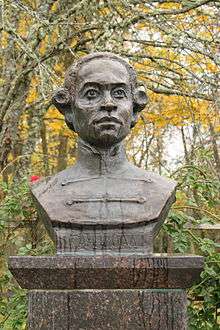Afro-Russian
| Total population | |
|---|---|
| 40,000[1] | |
| Regions with significant populations | |
| Moscow, St. Petersburg, Rostov-on-Don, Oryol, Lipetsk, Astrakhan | |
| Languages | |
| Russian · Abkhaz · Niger–Congo languages · Nilo-Saharan languages · English · French | |
| Religion | |
| Christianity, Islam |
Afro-Russians are people of Black African descent, or those who are perceived to be dark-skinned compared to other given populations that have migrated to and settled in Russia. The Metis Foundation estimates that there are about 40,000 Afro-Russians.[2]
Terminology
Representatives of African peoples in the Russian language are commonly called “negry”.[3] The word "negr" comes from the Spanish: negro through other European languages (German: Neger, French: nègre). Although in the Russian language this word, unlike English: negro, and especially the derogatory English: nigger, does not carry a negative connotation (as evidenced by the presence of the word in many authoritative Russian dictionaries),[4][3] in recent years, however, people have avoided using this term.
During the Russian Empire

There are very few recorded instances of black Africans settling down in the Russian Empire. A notable member of this small group is Abram Petrovich Gannibal: an African emancipated and adopted by Peter the Great, given education, raised to nobility, and served in both civil and military capacities. He is also a great-grandfather on the maternal side to the famed Russian poet Alexander Pushkin.
Early Soviet period
After the revolution several black African families came to the Soviet Union under the auspices of the Comintern. They were chiefly specialists in the spheres of industrial production and agriculture. The technical equipment, modest means, and professional experience brought by them were an appreciable contribution to economic development of a new state. Among them were Oliver John Golden and his wife Bertha Bialek (he brought with him a group of 16 Afro-American experts in the cultivation of cotton), well-known African-American poet Langston Hughes with a group of 22 filmmakers, Paul Robeson with his family and many others. Some of them stayed in Russia and their descendants still live there.
Post War, The Festival Children
When African nations gained independence from colonialism, the Soviet Union offered scholarships to young people from these nations. About 400,000 Africans studied in the former Soviet Union between the late 1950s and 1990.[5] The first significant arrival of Africans was for the 6th World Festival of Youth and Students held in Moscow in 1957. Many Africans also attended the Patrice Lumumba University.
Notable Afro-Russians
- Epiphanny Prince (African American and dual Russian and American citizen), basketball player
- Deanna Nolan (African American and dual Russian and American citizen), basketball player
- Lyukman Adams (Nigerian father), triple jumper
- Aleksandr Alumona (Nigerian father), footballer
- Cirilo Tadeus Cardozo Filho (Brazilian born), futsal player
- Joaquim Crima (born in Guinea Bissau), farmer and politician
- Allan Dugblei (Ghanaian father), footballer
- Abram Gannibal (Central Africa), statesman, military leader, politician
- Ivan Gannibal (son of Abram Gannibal), military leader
- Roy Jones, Jr. (African American and dual Russian and American citizen), boxer
- Alice Edun (Nigerian father), singer
- Nkeirouka Ezekh (Nigerian father), Olympic curler
- Jon Robert Holden (African American and dual Russian and American citizen), basketball player
- Brian Idowu (Nigerian father, half-Nigerian / half-Russian mother), Russian Premier League footballer
- Victor Keyru (Sierra Leonean father), basketball player
- Yelena Khanga (Zanzibari father, African-American mother), journalist and TV anchor
- Sergei Fanuelovich Kotov (orphan of Ghanaian father and Russian mother), Ghanaian tribal king[6]
- Stanislav Lebamba (Congolese father), footballer
- Cyrille Makanda (Camerounian father), basketball player
- Avua-Siav Leo Nelson (Ghanaian father), footballer
- Peter Odemwingie (Nigerian father), footballer
- Adessoye Oyewole (Nigerian father), footballer
- James Lloydovich Patterson, Russian actor of African American and Ukrainian descent
- Jean Sagbo (Benin-born naturalized Russian), politician, elected councilman of the town of Novozavidovo
- Jerry-Christian Tchuissé (Camerounian born), footballer
- Emiliya Turey (mixed-race father of Sierra Leonean descent), handball player
- Devis Uko (Nigerian father), footballer
- Grigory Siyatvinda (mixed-race father of Zambian descent), actor
- Samson Sholademi (mixed-race father of Nigerian descent), businessman, blogger and politician
- Elladj Baldé (Guinean father),figure skater
- Jacques Anthony (Congolese father), rapper
See also
References
- ↑ O'Flynn, Kevin (26 August 2009). "Russia’s Black Community". The Washington Post. Retrieved 25 February 2010.
- ↑ Gribanova, Lyubov "Дети-метисы в России: свои среди чужих" Archived 4 November 2008 at the Wayback Machine. (in Russian). Nashi Deti Project. Retrieved 25 February 2010.
- 1 2 "Негры". Brockhaus and Efron Encyclopedic Dictionary: In 86 Volumes (82 Volumes and 4 Additional Volumes). St. Petersburg. 1890–1907.
;
Negr // Dictionary of the Russian Language (Ozhegov): (first edition 1949, the reference to the edition of 1992 together with Natalia Shvedova). - ↑ This article includes content derived from the Great Soviet Encyclopedia, 1969–1978, which is partially in the public domain.
- ↑ Lily Golden & Lily Dixon "TV project «Black Russians»". Africana Project. Retrieved 25 February 2010.
- ↑ Wrigley, Matt (9 July 2006). "Abandoned in Moscow, enrolled in the Red Army and finally crowned as a king". The Daily Telegraph. Retrieved 25 February 2010.
External links
- Funmetis a Foundation for Afro-Russian Children
- (in Russian) Article "Afro-Russians" from Rossiyskaya Gazeta
- (in Russian) Article "Black Man" from Online Vremya